Cashews are a nut that grows on a tree native to South America, and are an excellent source of unsaturated fats, fiber, and protein.
They’re a good snack food to replace processed foods like chips and sweets, which are high in sugar and refined carbohydrates. Cashews can be eaten raw, which makes them a favorite snack for those on the paleo diet or the whole30 diet.
Looking to add a health snack to your pantry? Cashews are a great option. Our researchers have ranked the ten best cashew brands of the year, plus taken a detailed look at the nutritional research on the health benefits of regular cashew consumption.
Research
Rankings
1. Terrasoul Superfoods Raw Whole Cashews
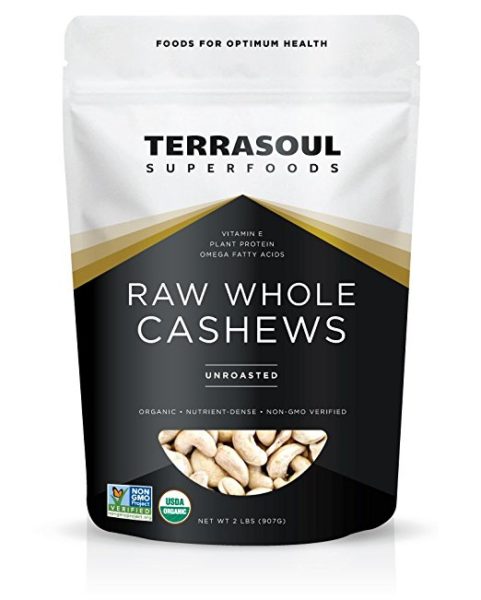
Terrasoul Superfoods Raw Whole Cashews come in a 32 ounce resealable bag and are both organically grown and totally raw.
That means there are no additional oils added, and no salt added either. They’re an excellent option whether you are trying to reduce the sodium in your diet, or whether you are looking for a source of healthy fats and protein to replace unhealthy, processed snack foods.
Thanks to its organic certification, you don’t need to worry about synthetic pesticides or herbicides, either. With all of these benefits, Terrasoul Superfoods Raw Whole Cashews are our top pick.
2. Jiva Organics Raw Organic Cashews
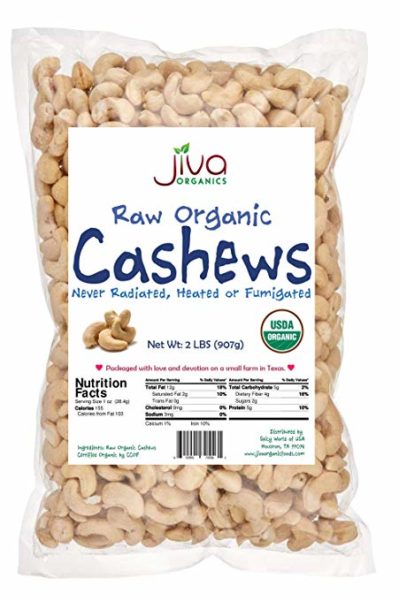
Jiva Organics Raw Organic Cashews makes a minimally processed raw and organically certified cashew, which comes in a simple two-pound bag.
The bag isn’t resealable, so you’ll have to find your own airtight container to store these after you’ve opened the packaging, but they’re still a favorite among low-carb, paleo, and whole 30 dieters.
3. Sunshine Nut Company Cashews
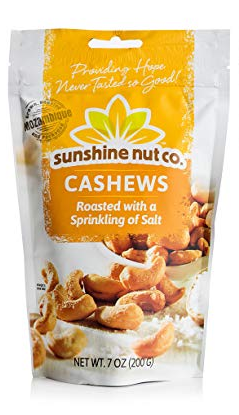
Sunshine Nut Company Cashews are a rare find among roasted cashews—these cashews are peanut-free and are carefully processed to avoid cross-contamination with other allergens like gluten.
The sodium content is also notably lower than many other competitors, making them a great option for people who are trying to reduce their salt intake but who don’t like the taste of raw unsalted cashews.
The only downside to these cashews is that they are not organically grown, but if that does not bother you, this is an excellent product.
4. I’m A Nut Raw Cashews
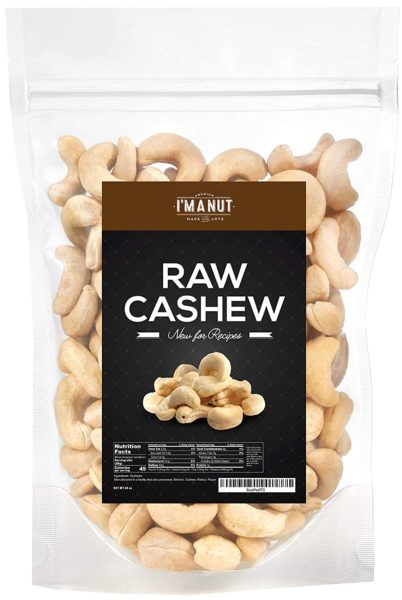
This excellent raw cashew product is completely raw and unprocessed, making it great for the keto, paleo, or whole30 diet. While it’s not organic, there’s no added sodium or extra vegetable oils to worry about.
On top of that, the bulk three-pound size is perfect for people who rely on cashews as a regular snack.
5. Sincerely Nuts Cashews

Sincerely Nuts Cashews is a super-simple bulk option for cashews that comes in a resealable three pound bag.
These cashews are organically certified and have no extraneous ingredients, though (perhaps because of the spartan packaging) aren’t as popular among health enthusiasts.
6. Nut Harvest Whole Cashews
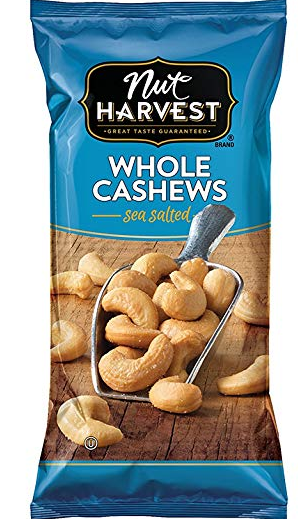
Nut Harvest Whole Cashews are a great solution if you need pre-packaged snack-sized bags of cashews. Each of these 2.25-ounce packets makes for two 180 calorie servings of cashews, which are roasted with peanut oil and flavored with sea salt. If you want a raw option, or something with less sodium, you’ll have to look elsewhere.
7. Happy Belly Fancy Whole Cashews
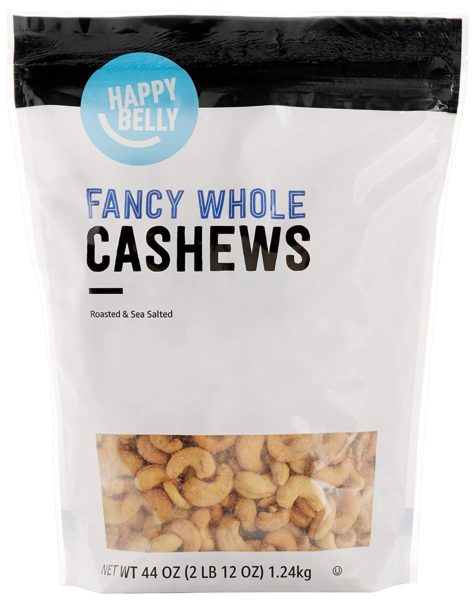
Happy Belly, Amazon’s in-house brand, makes a roasted whole cashew that comes in a simple 44 ounce plastic bag, and is a solid choice for snacking and serving at dinner parties.
Like many of the other roasted cashews on the market, it also includes a blend of different vegetable oils from the roasting process, which may include peanut oil—that means it’s a no-go if you have a peanut allergy.
That aside, the use of sea salt for flavoring adds some trace minerals, though people looking to keep their sodium intake low should still opt for an unsalted variety.
8. Planters Fancy Whole Cashews
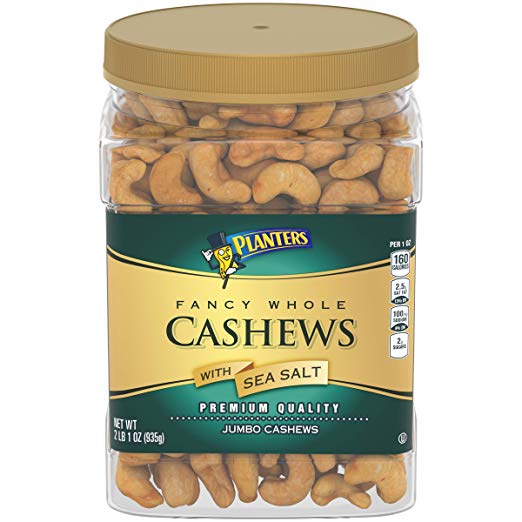
Planters is a major player when it comes to nuts of all kinds, so it’s no surprise they are a heavy hitter when it comes to cashews.
Their fancy whole cashews are roasted and salted, and use peanut oil to assist with the roasting process. The use of peanut oil is problematic for people with peanut allergies, because cashews (and other tree nuts like almonds) are a popular replacement—a peanut allergy is not the same thing as a tree nut allergy.
However, because Planters uses this additional oil, these nuts are off the table for both types of allergies. That issue aside, it’s a solid two-pound container of cashews.
9. Jaybee’s Whole Cashews
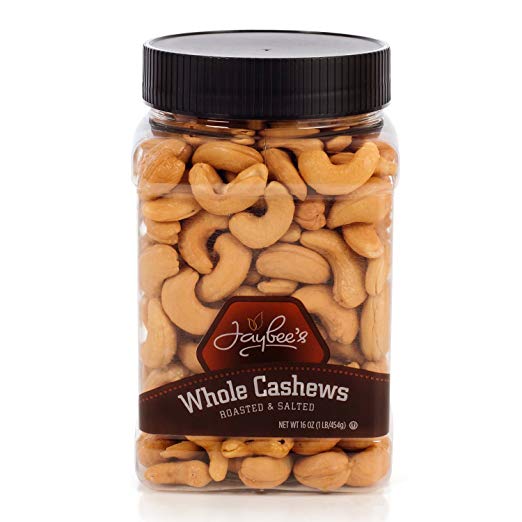
Jaybee’s Whole Cashews come in a small 16 ounce plastic tub, which makes them a good option for people who are only occasional snackers.
Bulk users will definitely want to go with a different option. As with most roasted cashews, these cashews contain vegetable oils including peanut oil, and these nuts in particular are processed alongside many other allergens, so they may not be the best option for people with sensitivities to soy, dairy, or eggs.
10. Member’s Mark Cashews
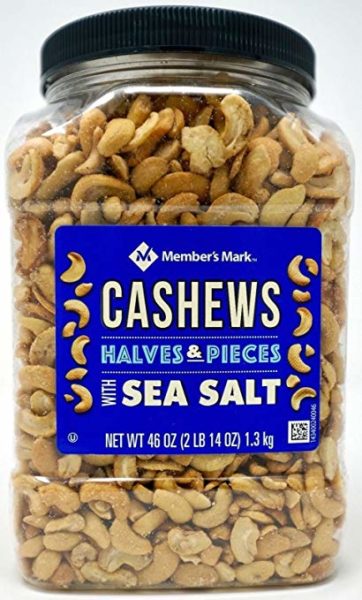
Members Mark Cashews are roasted and salted, and come not as whole cashews, but a mix of whole and half-cashew nuts.
The roasting process introduces peanut oil, and while the sodium content is fairly low, the large plastic 46 ounce tub is a bit unwieldy for some people.
Despite that, if you want a bulk source of cashews that are already roasted and salted, and don’t mind the presence of peanut oil, Member’s Mark is still a solid choice.
Category winners
Best cashews overall: Terrasoul Superfoods Raw Whole Cashews
Organic, raw, and with zero extraneous ingredients, Terrasoul takes our overall recommendation thanks to this brilliant simplicity.
Best organic cashews: Terrasoul Superfoods Raw Whole Cashews
Terrasoul has a great reputation for organic and non-GMO foods, and their cashews are no exception. Sourced from Vietnam and the Ivory Coast, these are our favorite when it comes to organic cashews.
Best roasted cashews: Sunshine Nut Company Cashews
Sunshine Nut Company offers excellent variety when it comes to roasted cashews. Roasted and plain? No problem. Want your cashews salted as well? They’ve got that covered too. Flavored with herbs? Also an option! With such a range of choices, you’ll never get tired of these roasted cashews.
Best raw cashews: Terrasoul Superfoods Raw Whole Cashews
For cashews that are compatible with paleo, whole30, and other raw-food diets, Terrasoul is the best option on the market. These certified organic cashews are unprocessed, providing the highest quality nutrients found in the plant.
Best salted cashews: Sunshine Nuts Salted Cashews
Sunshine Nut Company offers both plain and salted cashews, with just the right amount of salt on their ‘sprinkling of salt’ flavor. If you still want more variety, you can opt for their ‘sugar and spice’ or ‘handful of herbs’ flavored cashews as well!
Best cashews for the keto diet: Sincerely Nuts Whole Cashews
Keto dieters lean heavily on nuts like cashews for between-meal snacking, thanks to their high energy density and high content of healthy fat. The bulk size of Sincerely Nuts Whole Cashews is perfect for keto dieters, as is the great taste of these roasted and salted cashews.
Who Should Buy Cashews?
Cashews are great for individuals of all ages, but are specifically beneficial to individuals that suffer from metabolic syndrome. Metabolic syndrome is a cluster of conditions including excess body fat, high blood pressure, abnormal cholesterol and high blood sugar. These conditions combine to increase your risk of heart disease, stroke and type 2 diabetes. Cashews help to fight all of these and combat metabolic syndrome.
How We Ranked
All the products on our list contained roasted cashews outside of their shell. The shell around the cashew contains urushiol, the same substance found in poison ivy, and the inside of the shell contains a toxic resin. Roasted cashews are offered both salted and unsalted, as well as whole or in pieces. We did lean towards the unstated variety, like the Sunshine Nut Company Cashews, because of the slight health benefits it offers.
There is also the option of having cashews dry-roasted, meaning the nuts were cooked without any added oil. Raw is another option which limited fat content – although no cashew is completely raw because it needs to be cooked a bit to extract it from the poisonous exterior. We loved products like NOW Foods and Jiva Organics that provided raw cashews because it helped lower the overall fat content of the nut, helping you to avoid excess calories.
Cashews come in a variety of forms, but are often sold in 2 ways: bulk or pre-packaged containers. We preferred pre packaged containers, like Happy Belly, that used vacuum-packed jars or cans over cellophane packaging because it extended the freshness of the cashews. While we didn’t opt for bulk bin cashews on our list, they are still a viable option if the cashews are covered and that the store has good product turnover to maintain freshness.
We also looked for organic certification. Products like Terrasoul Superfoods, that were organic certified, kept quality high and allowed us to be confident that we don’t need to worry about synthetic pesticides or herbicides in the product.
Benefits
Cashews are a tree nut, meaning they belong to the same family of foods as almonds, brazil nuts, hazelnuts, and pecans. Tree nuts in general, and cashews in particular, are a fantastic source of healthy fats, high-quality protein, dietary fiber, and important trace minerals like iron, zinc, and magnesium.
The combination of high fat, fiber, and protein content, plus low carbohydrate and sugar content, makes them a great replacement for processed snack foods.
If you opt for raw and unsalted cashews, as many people on the paleo and whole30 diet do, they also help keep your sodium intake low. On top of this high nutritional value, there’s good scientific evidence to back up the health benefits of cashews.
Regular consumption of cashews reduces the risk of heart disease. A few decades ago, the prevailing wisdom among nutritional epidemiology researchers was that consuming a diet that was low in fat was the best way to prevent heart disease.
This hypothesis was based on nutritional studies that found that high-fat diets were related to a greater risk of heart disease.
However, when researchers began to examine the composition of high-fat diets, they found that not all fats were equal.
According to an article published in 1999 in the American Journal of Clinical Nutrition, regular consumption of nuts, such as cashews, is actually associated with a substantial decrease in heart disease risk (1).
The author cites a study done on Seventh-day Adventists, who are an ideal population to examine the relationship between nut consumption and heart disease, because most adherents are vegetarian to begin with. This removes the potential for the confounding effects of meat consumption.
This study, along with another women’s health study conducted in Iowa, concluded that regular consumption of nut had a marked protective effect on risk for heart disease. Other research found that these benefits extended to people who are not vegetarian as well.
These broad-scale studies don’t provide evidence on why cashew are so beneficial for heart health, but the authors of these studies hypothesized that the benefits had to do with the high unsaturated fat content, or the antioxidant powers of nuts.
Cashews can help lower your cholesterol. One potential explanation for the benefits of cashews on heart disease may be their ability to lower cholesterol levels.
Because of the epidemiological evidence, researchers suspected a link between cashews and risk factors for heart disease, but strong evidence for a protective mechanism comes from a study published in 2017 that tested the effects of cashew consumption on cholesterol levels in a clinical trial (2).
The experimenters recruited 51 men and women and randomly assigned them to either a cashew snack or a potato chip snack (representing a typical processed-food snack found in the standard American diet).
The researchers then tracked the subjects for one month, then switched the groups in a crossover design. After analyzing the data, the researchers found that the cashew diet was associated with significant decreases in both LDL (“bad”) cholesterol and total cholesterol, compared to the potato chip diet.
The results of this study provide strong evidence that replacing typical snack foods with cashews is a better way to achieve strong long-term health.
Cashews can help control blood sugar. One of the problems with traditional snack foods that are high in sugar or high in refined carbohydrates is that they contribute to the development of insulin insensitivity, and eventually metabolic syndrome and type two diabetes.
Several published studies have demonstrated the ability of tree nuts such as cashews to help people with type two diabetes better control their blood sugar.
A meta-analysis published in 2014 in the journal PLoS ONE pooled the results of twelve different studies with a total of 450 subjects (3).
The results found that consumption of tree nuts such as cashews was associated with improved glycemic control, which indicates that they can be included in a diet to reduce or perhaps even prevent type two diabetes.
Side effects
As a tree nut, cashews can cause allergic reactions in people whose immune system is sensitive to any kind of tree nut. According to a systematic review of the scientific literature that was published in 2015 in Current Allergy and Asthma Reports estimates the prevalence of true tree nut allergies at approximately 2% (4).
In addition to systemic allergic reactions, some people are prone to a condition called oral allergy syndrome. In this syndrome, tissue in the mouth, throat, and lips get itchy or irritated after exposure to certain foods. The reaction can be worse during the allergy season, and seems to be linked to pollen allergies (5).
Though it is usually more mild, it can in rare cases be severe. Cashews, like all other tree nuts, can also cause oral allergy syndrome.
The prevalence of this syndrome is higher than systemic allergic reactions; its prevalence has been estimated at between eight and 11%. Finally, like other nuts, whole cashews should not be eaten by small children, as they can cause choking.
Recommended intake
As a natural food, cashews do not necessarily need a particular “dose” for optimal effects. Clinical research has used a range of daily intake levels, some of which are surprisingly high.
Two separate studies, for example, used cashews to provide 10-11% of the total caloric intake for the participants each day (6, 7).
This translates to about 28 to 64 grams of cashews per day. Other research, particularly epidemiology studies, have found that consuming nuts like cashews at lower levels is beneficial, too, so massive amounts of cashew intake aren’t necessary to harness the health benefits of this tree nut.
FAQ
If cashews are so good for you, why are they considered unhealthy? Cashews are good for you, but they contain a high amount of calories, which can make them unhealthy. This excess amount of calories can lead to weight gain, which comes with a whole host of other issues.
Are cashews considered a nut? The cashew is technically not a nut. Cashews are seeds that get harvested from a special cashew apples, that come from the cashew tree. Although it is not popular in the USA, a lot of countries consider cashews apples a delicious addition to juices, jams, liqueur, and curries.
Can I eat the cashew shell? No, you can’t eat the cashew shell because it’s poisonous. Raw cashews contain a resin known as urushiol which is very toxic. If you eat it, you will get very sick, and if it contacts your skin, you may end up with burns or rashes. Urushiol is also found in mangoes, and it is the ingredient that causes poison ivy to be as poisonous as it is.
How do I know what the best type of cashew is? Neither type of cashew is better or worse. Raw cashews are not ever truly raw because of the toxic shell we mentioned, but the raw ones are far more raw tasting than roasted cashews. They have been cooked just enough to get rid of the toxic urushiol and are often sold salted or unsalted, whole or in pieces. If you are restricting your fats, then roasted cashews are the best option, since they have a lower fat content than any other nut.
How long are cashews good for? The shelf life of cashews varies greatly based on packaging and storage. On average, cashews will last for about 6 months. If you freeze them, they can last an additional 6 months. Preventing moisture from penetrating the packaging is also important as that will decrease the shelf life. A good way to test whether they are fresh is by smelling them. If they don’t smell like nuts do, or you notice a funny odor, then the cashews are not safe. Old cashews will start to smell more like paint than nuts. Color discoloration is another sign that your cashews are going bad.
Can cashews help you sleep? Yes, cashews contain magnesium which acts like a sedative to help you sleep.
How are cashews packaged? Packaged cashews come in a variety of different options. They are sold in resealable and non-re-sealable bags as well as in cans and plastic jars. When you buy prepackaged cashews, you want to make sure that you are buying a vacuum-packed jaw or can. These work better than cellophane packaging and will keep your nuts fresh for longer.
How do you know if cashews have gone bad? You want to eye the cashews and make sure they’re not shriveling because that’s a sign that the cashew has gone bad.
How should cashews be stored? You should store your cashews in a cool and dry area. The oil contained in them will prolong their lifespan, but it also creates a space for them to go rancid quickly if they absorb moisture. An airtight container, in a refrigerator, is the best place to store your cashews.
Why are cashews so expensive? Cashews are more expensive than a few other types of nuts because the process for harvesting them is quite involved. First, cashews need a tropical environment to grow and most of them come from Brazil, India, Africa, and Vietnam. Imported goods always pass the price of import along to the consumers. Because they are seeds, you have to harvest the apples, which are toxic to touch. This makes them a bit difficult to harvest since the nuts must be plucked individually from the fruit. To get rid of the toxins, cashews need to be dried and roasted, further adding to the process.
What happens when you eat too many cashews? When you eat too many cashews, it can lead to excess weight gain.
What’s the cashew legend? Local legend has it that the Devil was jealous of God for creating such delicious and beautiful fruit and wanted to create one of his own. He created a golden cashew apple and presented it to God in pride. God explained that his fruit would be very short-lived because it had no seed s to repopulate itself, so the Devil simply stuck a seed to the outside of the fruit, on the bottom. To ensure that it would be eternally protected, he wrapped the seed in toxin so no one would eat it and prevent his fruit from reproduction. This, the natives say, is how the cashew was born.
Do cashews lower heart disease? Yes, research shows that the regular consumption of cashews reduces the risk of heart disease. It is hypothesized that the reduction comes from the high unsaturated fat content, or the antioxidant properties found in cashews.
Are cashew’s poisonous? Yes, cashews are poisonous and unsafe to eat completely raw. This is because they contain a toxic resin called urushiol, which causes rashes if it touches the skin. To remove this substance, cashews must go through a rigorous roasting or steaming process to ensure they are safe to eat. As such, even raw cashews are never completely raw.
Is saturated fat bad for you? Not all fats are created alike, and not all fats are evil (8). Saturated fats are the type you can enjoy in moderation since they’re not harmful as long as you don’t overdo them. Saturated fats include things like whole milk, red meats, cheese, coconut oil, and all the commercially prepared baked goods and bread. If you consume too much saturated fat, it will elevate your cholesterol and tip your cholesterol balance not in your favor. Most nutritionists recommend that you have less than 10% of your calories come from saturated fat each day.
Do cashews contain healthy fat? Yes, cashews contain healthy fats including monounsaturated and polyunsaturated fats. Monounsaturated fats will lower your risk of heart disease are found in olive oil, avocados, nuts, and sunflower oils are all great sources of monounsaturated fats. Polyunsaturated fats are another form of fat that are essential to your body (9). Polyunsaturated fats build your cells, help with nerve function, allow your blood to clot and heal, and are necessary for muscle movement.
What are the side effects of cashews? The most serious side effect of cashew is an allergic reaction, which affects 2% of the population. Whole cashews can also cause choking in certain individuals.
What are trans fats? Trans fat is a byproduct that occurs when healthy oils are turned into solids to preserve them. This fat is so bad for you that labels were required to print a specific trans fat content for food. They provide zero health benefits, and there is no safe level of consumption. The good news is that they’re actually no longer allowed in the USA. When you eat these fats, it increases your LDL cholesterol, which is the bad type of cholesterol to be in your bloodstream and reduces the good cholesterol, or HDL.
Do cashews lower your cholesterol? Yes, research supports the idea that cashews can help lower your cholesterol. Research from a study published in 2017, involving both men and women found that the cashews were associated with significant decreases in both total and bad LDL cholesterol (10).
Do cashews contain omega 3 fatty acids? Yes, cashews contain omega 3 fatty acids. In fact, cashew nuts have the highest omega-3 fatty acid content, containing 0.14g of omega 3 fatty acids per 100g of cashew nuts.
Are cashews good for weight loss? Cashews can be good for weight loss, but it depends on the amount you eat. Cashews contain protein which is a key to weight loss as well as magnesium, which helps to regulate your metabolism.
What is the main fat in cashew nuts? Oleic acid, which is known to be a heart-healthy mono-unsaturated fat, makes up 75% of the fat in cashew nuts.
Do cashews help manage blood sugar? Yes, research shows that cashews can help control and manage blood sugar which is especially important for diabetics. A 2014 meta-analysis involving 450 subjects shows that consumption of tree nuts such as cashews was associated with improved glycemic control, which indicates that they can be included in a diet to reduce or perhaps even prevent type two diabetes (11).
What is oral allergy syndrome? Oral allergy syndrome is when tissue in the mouth, throat, and lips get itchy or irritated after exposure to certain foods.
What is the proper dose of cashews for a normal person? Since cashews are a natural food, there is no set dosage. Some databases recommend around 30-60g of cashews per day.
How many calories are in cashews? 100g of cashews contains 553 calories, 8g of saturated fat, 8g of polyunsaturated fat, 24g of monounsaturated fat, 30g of carbs, 3.3g of fiber, 6g of sugar and 18g of protein. It also contains 660mg of potassium, 3% of your daily calcium 37% of your daily iron, 20% of your daily vitamin B6 and 73% of your daily magnesium. If they are unsalted, cashews naturally contain around 12mg of sodium.
Are cashews actually nuts? No, cashews are not actually nuts, but rather fruits from the cashew tree. The real fruit of the cashew tree is the kidney-shaped formation growing at the end.
Related Articles
Recap
Cashews are a tree nut that makes and excellent healthy snack. They are high in healthy fats, protein, fiber, and antioxidants.
Moreover, they have demonstrable long-term health benefits: cashew consumption has been consistently associated with a decreased risk of heart disease, and clinical research has shown that regular consumption of cashews can reduce LDL cholesterol levels, which leads to a decreased risk of heart disease.
Outside of people who have a tree nut allergy and small children, cashews are a great snack food for just about anybody.
They can be incorporated into paleo, whole30, and low-carb diets easily, and research supports beneficial effects even at very high intakes—over ten percent of your calories can come from cashews if you’d like. Compared to a standard snack food like potato chips, cashews are a hands-down winner.
For Body Nutrition’s #1 cashew recommendation, click here.